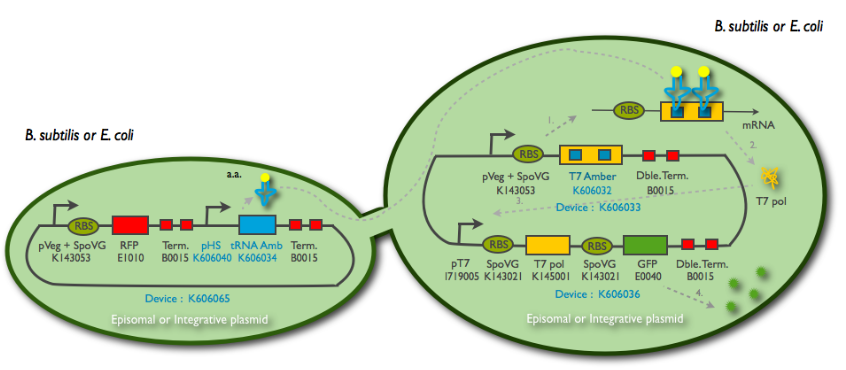Team:Paris Bettencourt/Experiments/pHyperSpank
From 2011.igem.org
(Difference between revisions)
m |
|||
| Line 6: | Line 6: | ||
<h2>Design overview</h2> | <h2>Design overview</h2> | ||
| - | + | </html> | |
[[File:tRNA_amber_principle.jpg|945px|center|The tRNA Amber diffusion system principle]] | [[File:tRNA_amber_principle.jpg|945px|center|The tRNA Amber diffusion system principle]] | ||
| - | The Hyperspank promoter was designed to be compatible for B. subtilis. It is shorter thant the classic one, but is also recognised by E. coli polymerases. | + | The Hyperspank promoter was designed to be compatible for B. subtilis. It is shorter thant the classic one, but is also recognised by E. coli polymerases. <br> |
| - | We cloned it first behind the amber tRNA that would induce a GFP amber on an other plasmid. Then to characterise it we cloned it behind an RFP, into TURBO cells that are LacIq to allow the promoter to be the less leacky possible. | + | We cloned it first behind the amber tRNA that would induce a GFP amber on an other plasmid. Then to characterise it we cloned it behind an RFP, into TURBO cells that are LacIq to allow the promoter to be the less leacky possible.<br> |
The pictures below are the results of an IPTG induction. | The pictures below are the results of an IPTG induction. | ||
| - | + | ||
<html> | <html> | ||
Revision as of 03:38, 22 September 2011

pHyperSpank characterisation
Design overview
The Hyperspank promoter was designed to be compatible for B. subtilis. It is shorter thant the classic one, but is also recognised by E. coli polymerases.
We cloned it first behind the amber tRNA that would induce a GFP amber on an other plasmid. Then to characterise it we cloned it behind an RFP, into TURBO cells that are LacIq to allow the promoter to be the less leacky possible.
The pictures below are the results of an IPTG induction.
 "
"


